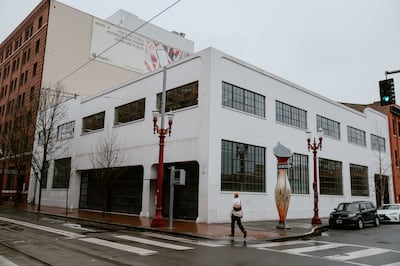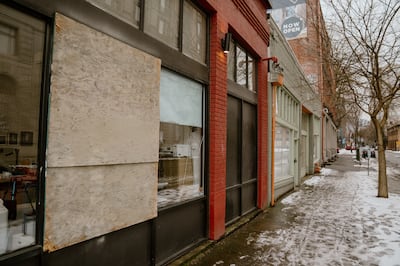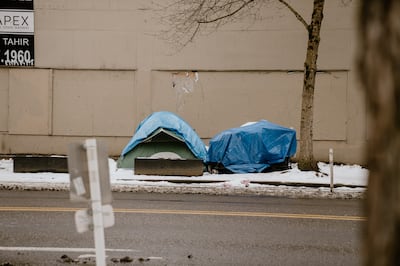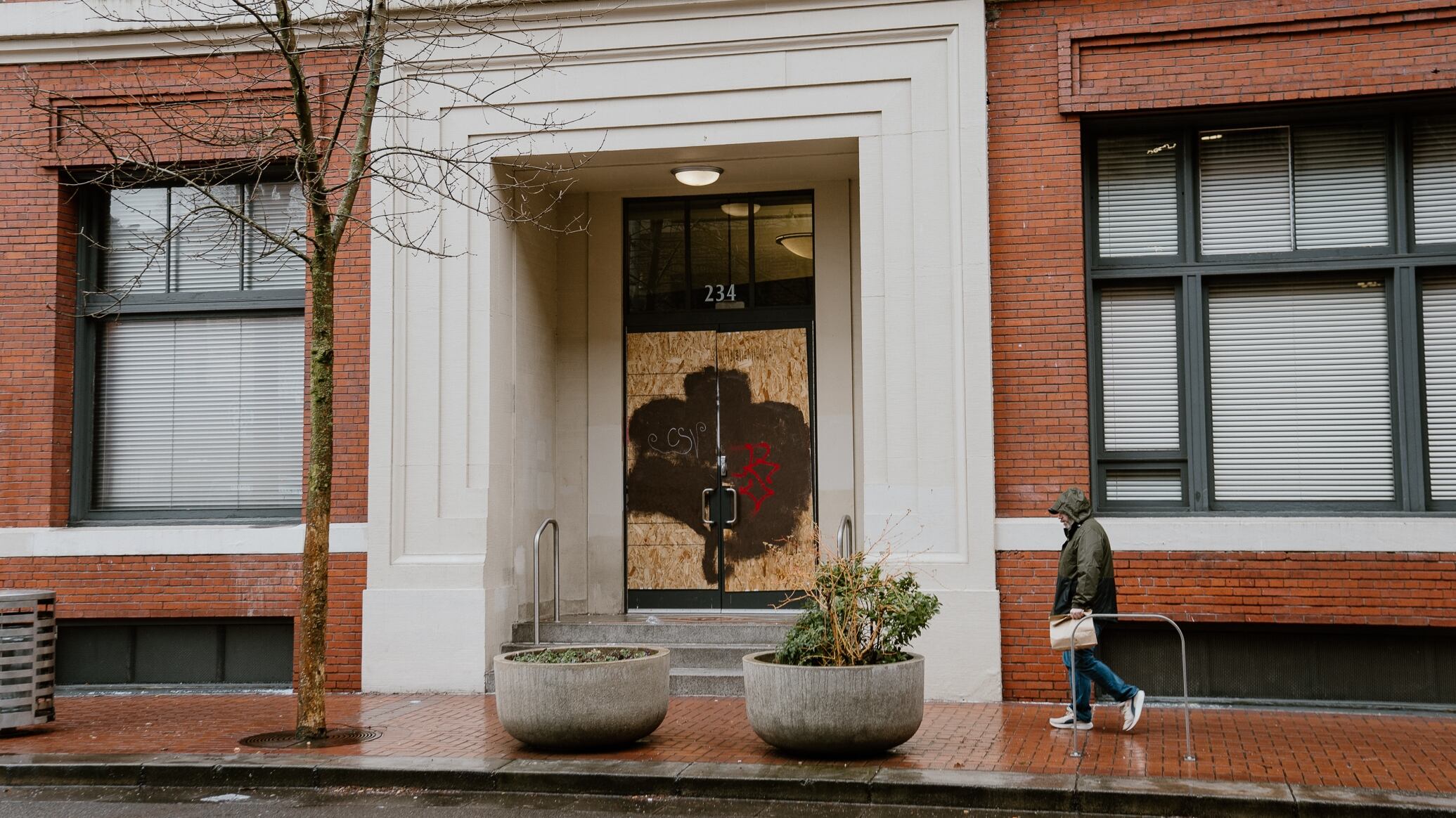Last week, the city’s economic development agency approved a $7 million loan to an ambitious athletic apparel incubator in Old Town that its principals say will bring economic gains to a troubled neighborhood.
Prosper Portland is making the loan to a project called Made in Old Town to finance the purchase of two mostly vacant commercial buildings, the first of a number of planned purchases. The men behind the project say they will eventually buy up nine buildings in Old Town and turn them into a shoe and athletic apparel manufacturing campus totaling 323,000 square feet, filled with 3D printers, innovation workspaces, manufacturing equipment and dozens of businesses.
“We’re crafting a new economic base for the part of the city that needs it,” Matthew Claudel, one of the principals of Made in Old Town, explained to Prosper’s board last week, minutes before it approved the loan. “This is an initiative by the community, for the community.”
But in approving the loan, Prosper Portland flouted its own guidelines for commercial loans, written just 11 months before. The loan is bigger, for a longer duration, and at a lower interest rate than the agency’s guidelines would suggest is prudent.
Made in Old Town’s leaders, and Prosper, say the loan is a sound investment. “As the city’s economic and urban development agency, part of our role is to invest in higher-risk areas and projects where the private sector will not,” says Prosper spokesman Shawn Uhlman, “particularly in light of the decreasing valuation of our downtown and Old Town commercial properties.”
Its critics say the loan is highly speculative and shows a lack of due diligence by Prosper.
“I want to know that we’re good stewards of public money,” says Portland City Councilor Mitch Green, who represents the city’s westside and previously worked as an economist. “A loan on those speculative terms, with no business plan as far as I can tell, it’s basically the city saying, ‘We don’t expect the money to ever come back.’”
For decades, Prosper’s specialty was establishing tax-increment financing districts, also known as urban renewal areas, to revive blighted neighborhoods across the city. How it works: Prosper draws a line around a troubled area of the city. It borrows against future property tax revenues in the district. For the next several decades, new property taxes over the base revenue stay inside the district instead of going to the city’s general fund.
Prosper created the River District in 1998. It covered much of downtown Portland and extended into Northwest Portland. In 2009, the Portland City Council expanded the boundaries of the district, adding much of Old Town and Chinatown.
In 2019, the City Council extended the Old Town Action Plan for another five years.
This year, Prosper is seeking to spend $35 million of its River District TIF funds in Old Town. According to Prosper’s draft plan dated Dec. 4, 2024, a copy of which WW obtained, Prosper proposes spending $30 million of the $35 million total on three projects: $16 million to convert an office building, the Falcon Building, into a 59-unit apartment building; $7 million to convert another office building, the Casket Building, to 34 units of mixed-income apartments; and $7 million to Made in Old Town.
In March 2024, Prosper established new commercial loan guidelines: The maximum loan should be $5 million, the interest rate should match the 10-year Treasury bond yield plus a margin (right now, about 7%), and the construction payback period should not exceed five years.
The Made in Old Town loan exceeds Prosper’s maximum commercial loan amount. It also calls for an interest rate of 3% and a construction payback period of 15 years.

Made in Old Town told the Prosper board last week that it’s contracted to pay $7.4 million for two buildings at 208 and 234 NW 5th Ave. that were recently appraised at $3.8 million. That places Prosper’s loan-to-value ratio at 182%. Prosper says it’s willing to go along with such a deal because it has faith that Made in Old Town will find $4.4 million in additional funding needed to complete improvements to the buildings that will raise their value to $13.8 million. Prosper says its concerns are also assuaged by the fact that Made in Old Town already has eight letters of intent from interested tenants.
Greg Goodman, whose family owns a number of buildings on the westside, says he supports the Made in Old Town project. But he adds that Prosper’s loan is risky.
“It’s a very good concept, and it’s what we need to be doing,” Goodman says of the project’s vision. “But if they haven’t arranged 100% commitment for the $4.4 million, why would you buy a building for $7 million if it might not work out?”
For its part, Prosper says Made in Old Town is poised to propel “economic growth and innovation,” support small businesses, fill vacant properties, and revitalize the central city.
The structure of Made in Old Town is unusual and somewhat complicated.
The “operational arm” of the project is a limited liability company called Future Stack. Jonathan Cohen is the LLC’s manager, according to state business registry records. The project is governed by something called a perpetual purpose trust, whose three “trustors,” or principals, are Cohen, Claudel and Elias Stahl, co-founder and CEO of the footwear startup HILOS. The trustee is Greg Bui, who for decades worked for various athletic apparel brands.
The trust is overseen by an entity called the Trust Stewardship Committee, which appears to have the authority to direct the trust’s decisions. The three members of the committee are Stahl; Eric Liedtke, Under Armour’s executive vice president of brand strategy; and Noel Kinder, former chief sustainability officer at Nike.

Also unusual has been the role people with ties to Made in Old Town have had in discussing Prosper’s investments in the neighborhood.
Prosper said it discussed potential projects with “Old Town community members who participate in the Old Town Community Association to confirm alignment with the Old Town Action Plan.” When asked which specific members Prosper met with for regular check-ins, Prosper listed five people.
Three of the five people have, or had, a financial stake in or tie to Made in Old Town.
Jonathan Cohen is the OTCA’s treasurer. Jessie Burke, board chair of the OTCA, is married to Cohen. (Burke’s role as chair of the OTCA board has recently come under fire, as WW reported last week.) Together, Cohen and Burke own The Society Hotel in Old Town and a second Society Hotel in Bingen, Wash.
Another former OTCA board member, Tom Clark, sold his Old Town office building to Made in Old Town in September. The project used state dollars for that purchase.
Burke says OTCA asked for regular meetings with Prosper about its investments in Old Town beginning in May 2022 “because we were not seeing funds spent down in the district” and “we wanted regular meetings to hear from Prosper how they planned to spend the remaining funds, and to create a sense urgency from the community.” But Burke says the OTCA board, and its individual members, had “no say in how funds are spent.”
Leaders of three cultural institutions that celebrate the origins of Old Town—the Lan Su Chinese Garden, the Japanese American Museum of Oregon, and the Portland Chinatown Museum—say they were largely kept in the dark about Made in Old Town.
“There is a need for more transparency about who is involved in this project, what their financial interests are, and how decisions are being made,” the institutions’ three directors, Elizabeth Nye, Hanako Wakatsuki-Chong, and Anna Truxes, say in a joint statement. “We are not aware of any public discussion or vote regarding a shift in Old Town’s zoning toward light manufacturing, despite the significant implications such a change may have.”
Made in Old Town principal Cohen says his organization went through the proper channels to secure the Prosper loan, including submitting an application. “Old Town Community Association members do not decide what Prosper does with its funds,” Cohen says.
The project has stated in public documents that it has $1.2 million in private capital, but it remains unclear where the rest of the financing for Made in Old Town will come from.
On Feb. 12, Cohen explained to the Prosper Portland board that his group was seeking $4.4 million more in funding from the state. When asked by board chair Gustavo Cruz Jr. what loan or grant the project was seeking, Cohen did not offer specifics. Cruz did not press the matter. Cohen declined to tell WW what state funding he was pursuing, citing “the integrity of the process.”
But other public agencies have rejected Made in Old Town’s applications for funding.
In October, regional government Metro rejected a request by Made in Old Town in conjunction with the city’s Bureau of Planning and Sustainability for a $662,000 planning grant for Phase 2 of the project. Among its reasons, according to Metro’s Oct. 22 rejection letter: “Applicant did not demonstrate demand for industry cluster in this area”; no proof of financial feasibility; “unproven and unsubstantiated” proof of project progress; and Made in Old Town is “an unknown entity.”
Metro also noted that $320,000 of the money would be paid to a consulting firm called Field States to draw up the plans. Field States is an urban planning firm founded by Claudel.
Another $66,000 would have gone to a second contractor, Equity Development Lab. That’s Cohen’s consulting company. (In response to WW’s questions, Cohen said the two contractors were “highly qualified to efficiently lead this effort.”)

Made in Old Town also unsuccessfully sought $25 million from the Portland Clean Energy Fund last year.
In 2024, the Oregon Legislature approved a $2 million grant for Made in Old Town. Gov. Tina Kotek considered vetoing it but agreed not to after Made in Old Town pledged to secure $800,000 in non-state matching funds for the project.
In a letter to Kotek dated April 10, 2024, Cohen and Burke wrote that the OTCA, the neighborhood group, “acts as a fiscal sponsor for the MiOT project, providing financial controls, accountability, and reporting” and included other sources of funding.
Among the funding sources listed: $750,000 in PCEF funds and a $700,000 Prosper loan. The project had secured neither of those at the time. It never received PCEF dollars.
Now, Cohen tells WW, Made in Old Town will use a portion of the Prosper loan to match the remaining $800,000 from the Legislature. In short: They’re using one pot of public money to access another.
Kotek is unhappy with that.
“The governor expects recipients of taxpayer dollars to come to the state in good faith with viable projects that bring direct benefits to the public, and to meet the conditions set by the state in order to authorize funds. To date, this standard has not been met,” Kotek spokeswoman Elisabeth Shepard says, adding that the governor “urges caution in allocating additional resources to this project” without further proof of financial viability.
Cohen tells WW that Made in Old Town will “create a self-sustaining economic engine” that will help a long-neglected part of the city out of current dire straits.
“As it develops, the profits are reinvested in the Trust to improve the neighborhood,” Cohen says. “Portland can lead by creating a model that can be used to revitalize downtowns across America.”

